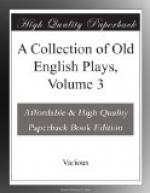Eld. Most willinglie; Yet suer I knowe hys harte [is] settled there Which to the courte is a contrarye spheare.
[Ex. Eldegr. and Gab.
Tur. Howe prettylie theise weomen can
dissemble! ... ... ... ... ...
O tys a foule and damned sorcerye
And maks the best of wisdome and of men,
Of fame and fortytude, more loosse then ayre,
Foolishe as idyotts, basse as cowardysse.
Why I am even rackt with complyment
And torturde past all suffrance; age nor sexe
Houlde difference in thys incantatyon.
But I will trye it further, harke a comes;
Nowe must I passe the pike of lunacye.
Enter Charlimayne, La Busse and Richard.
Char. Come, come, my dearest; wherefore
doe you starve
My quycke desyers with your so cruell absence?
I pray thee tender my declyninge age,
Stande allways neare that I may never faynte;
For thou inspyrst in me more strengthe and life
Then mightie nature when she made me younge.
Tur. Sir, I have allways beene your humblest servante.
Char. O you dyssemble fynelye!
Tur. I protest, sir.
Char. Nay, then I may beleive you flatter
me,
But say thou dost and seeme to love me dearelye,
For I confess, as freelye as I love,
One littell sparke of thee outbuys my kyngdome;
And when my kyngdomes gone pray what am I?
A pore decrepyd mysserable thynge
That needs no greater plauge then adge and wrinckles.
Tur. Indeed your passyon is toe vyolent.
I doe adore you next to dietie [sic]
And will lay downe my life for you to treade on.
Char. Oh[92] nowe religion teache me to
beleive
Another god, or I must forfayte heaven
And worshypp what I see, thys happy creature.
Nowe courtyers flatterye cannot keepe my sence
From knowinge what I feele, for I am weake:
Tys all my comfort nowe to thynke on thee
Who bryngst my captive soule to libertie.
Chuse then a fytt rewarde, examyne all,
All my domynions and authoryties;
Thynke what may please thee, make a full request
Or I shall growe a burthen to thy favors.
Tur. What shall I aske, that in your favours have All that I can desyer?
Char. Nay, aske me somethynge: Come, tell’t in myne eare?
Bus. What thynke you, lorde? Has any favrytt all he can desyer.
Rich. Yes, and a be contented.
Bus.—Right, sir, thats the questyon, but can a favoryte be so easylie contented?
Rich.—Most easylie, being such a worthy reverend prellatt.
Bus.—Foote, man, let him be ten thousand preists[93] and a will styll wante somethynge. Give hym but tyme and a wadger with thee, Richard, he asks somewhat. See, see, the emperour instructs hym; a good oulde loveinge soule and he is a good ould love he has chossen. I doe not nowe blame hys doatinge on my sister.




